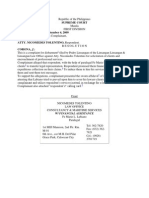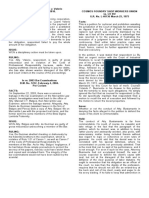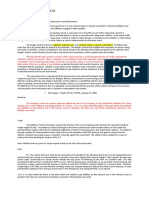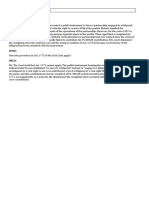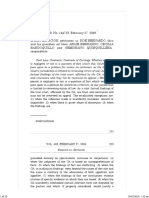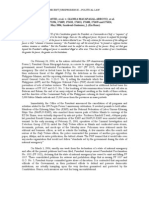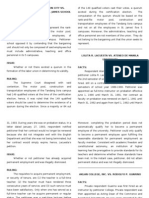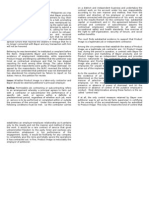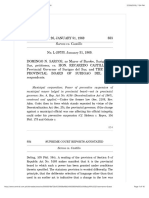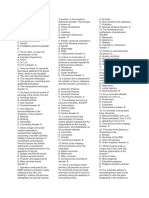TOSHIBA vs. CIR
TOSHIBA vs. CIR
Uploaded by
Deus DulayCopyright:
Available Formats
TOSHIBA vs. CIR
TOSHIBA vs. CIR
Uploaded by
Deus DulayOriginal Description:
Copyright
Available Formats
Share this document
Did you find this document useful?
Is this content inappropriate?
Copyright:
Available Formats
TOSHIBA vs. CIR
TOSHIBA vs. CIR
Uploaded by
Deus DulayCopyright:
Available Formats
TOSHIBA INFORMATION EQUIPMENT (PHILS.
), COMMISSIONER OF INTERNAL REVENUE
INC.,
vs.
not entitled to a ta- credit.refund because it $as only raised by the /I0 for the first time in his 9otion for 0econsideration" /I0 filed a Petition for 0e2ie$ $ith the /ourt of Appeals" The /ourt of Appeals granted the" The appellate court ruled that Toshiba $as not entitled to the refund of its alleged unused input VAT payments because it $as a ta-&e-empt entity" As a P:;A®istered corporation, Toshiba $as liable for remitting to the national go2ernment the fi2e percent 5!67 preferential rate on its gross income earned $ithin the :/*;*<:, in lieu of all other national and local ta-es, including VAT" The /ourt of Appeals further ad4udged that the e-port sales of Toshiba $ere VAT&e-empt, not %ero&rated, transactions" The appellate court found that the Ans$er filed by the /I0 did not contain any admission that the e-port sales of Toshiba $ere %ero& rated transactions" At the least, $hat $as admitted by the /I0 in said Ans$er $as that the Ta- /ode pro2isions cited in the Petition for 0e2ie$ of Toshiba $ere correct" As to the 3oint ,tipulation of +acts and Issues filed by the parties, the appellate court declared that the /I0 signed the said pleading through palpable mista=e" This palpable mista=e in the stipulation of facts should not be ta=en against the /I0, for to do other$ise $ould result in suppressing the truth through falsehood" In addition, the ,tate could not be put in estoppel by the mista=es or errors of its officials or agents" Toshiba filed a 9otion for 0econsideration but $as denied" >ence, Toshiba filed the instant Petition for 0e2ie$" ISSUE/S: ?*< the /ourt of Appeals erred $hen it failed to dismiss outright and ga2e due course to /I0@s petition not$ithstanding its failure to adequately raise in issue during the trial in the /ourt of TaAppeals Toshiba@s claim for refund" ?*< the /ourt of Appeals erred $hen it ruled that the /ourt of Ta- Appeals@ findings, $ith regard Toshiba@s e-port sales being %ero rated sales for 2at purposes, $ere based merely on the admissions made by /I0@s counsel and not supported by substantial e2idence"
FACTS: In its VAT returns for the first and second quarters of 1997, Toshiba declared input VAT payments in the aggregate sum of P3, 7!,139"#!, $ith no %ero&rated sales" Toshiba subsequently submitted its amended VAT returns in the same amount of input VAT payments but, this time, $ith %ero&rated sales totaling P7,'9',#77,((("((" Toshiba filed $ith the )*+ *ne&,top ,hop applications for tacredit.refund in the total amount of P3,# !,''#"73" /I0 opposed the claim for ta- refund.credit of Toshiba" 1pon being ad2ised by the /TA, Toshiba and the /I0 filed a 3oint ,tipulation of +acts and Issues" )uring the trial before the /TA, Toshiba presented documentary e2idence in support of its claim for ta- credit.refund, $hile the /I0 did not present any e2idence at all" /TA rendered its )ecision fa2oring Toshiba" According to the /TA, the /I0 himself admitted that the e-port sales of Toshiba $ere sub4ect to %ero percent 5(67 VAT based on the Ta- /ode" Toshiba could then claim ta- credit or refund" 8oth Toshiba and the /I0 sought reconsideration of the foregoing /TA )ecision" Toshiba asserted that it had presented proper substantiation for the input VAT disallo$ed by the /TA" The /I0, on the other hand, argued in his 9otion for 0econsideration that Toshiba $as not entitled to the credit.refund of its input VAT payments because as a P:;A®istered :/*;*<: e-port enterprise, Toshiba $as not sub4ect to VAT" /I0 contended that all businesses and establishments $ithin the :/*;*<: $ere to remit to the go2ernment fi2e percent 5!67 of their gross income earned $ithin the %one, in lieu of all ta-es, including VAT" The VAT& e-emption of Toshiba meant that its sale of goods $as not sub4ect to output VAT and Toshiba as seller $as not allo$ed any ta- credit on the input VAT it had pre2iously paid" The /TA issued a 0esolution denying both 9otions for 0econsideration of Toshiba and the /I0" The /TA too= note that the pieces of e2idence referred to by Toshiba in its 9otion for 0econsideration $ere insufficient substantiation, being mere schedules of input VAT payments it had purportedly paid" *n the other hand, /TA refused to consider the argument that Toshiba $as
RULING: The Petition is impressed $ith merit"
The CIR did not timely raise before the CTA the issues on the VAT-exemptions of Toshiba and its export sales. 1pon the failure of the /I0 to timely plead and pro2e before the /TA the defenses or ob4ections that Toshiba $as VAT&e-empt, and that its e-port sales $ere VAT&e-empt transactions, the /I0 is deemed to ha2e $ai2ed the same" The /I0 did not argue straight a$ay that Toshiba had no right to the credit.refund of its input VAT payments because the latter $as VAT&e-empt and its e-port sales $ere VAT&e-empt transactions" The /I0 passed up the opportunity to pro2e the supposed VAT& e-emptions of Toshiba and its e-port sales $hen the /I0 chose not to present any e2idence at all during the trial before the /TA" The /I0 had $aited until the /TA already rendered its )ecision $hich granted the claim for credit.refund of Toshiba, before asserting in his 9otion for 0econsideration that Toshiba $as VAT&e-empt and its e-port sales $ere VAT&e-empt transactions" It is a-iomatic in pleadings and practice that no ne$ issue in a case can be raised in a pleading $hich by due diligence could ha2e been raised in pre2ious pleadings" The /ourt cannot simply grant the plea of the /I0 that the procedural rules be rela-ed based on the general a2erment of the interest of substanti2e 4ustice" It should not be forgotten that the first and fundamental concern of the rules of procedure is to secure a 4ust determination of e2ery action" Procedural rules are designed to facilitate the ad4udication of cases" /ourts and litigants ali=e are en4oined to abide strictly by the rules" ?hile in certain instances, the /ourt allo$s a rela-ation in the application of the rules, it ne2er intends to forge a $eapon for erring litigants to 2iolate the rules $ith impunity" The liberal interpretation and application of rules apply only in proper cases of demonstrable merit and under 4ustifiable causes and circumstances" ?hile it is true that litigation is not a game of technicalities, it is equally true that e2ery case must be prosecuted in accordance $ith the prescribed procedure to ensure an orderly and speedy administration of 4ustice" Party litigants and their counsel are $ell ad2ised to abide by, rather than flaunt, procedural rules for these rules illumine the path of the la$ and rationali%e the pursuit of 4ustice" The CIR judicially admitted that Toshiba was VAT-registered and its export sales were subject to VAT at ero percent !"#$ rate.
The admission ha2ing been made in a stipulation of facts at pre& trial by the parties, it must be treated as a 4udicial admission" 1nder ,ection ', 0ule 1A9 of the 0ules of /ourt, a 4udicial admission requires no proof" The admission may be contradicted only by a sho$ing that it $as made through palpable mista=e or that no such admission $as made" The /ourt cannot lightly set aside a 4udicial admission especially $hen the opposing party relied upon the same and accordingly dispensed $ith further proof of the fact already admitted" An admission made by a party in the course of the proceedings does not require proof" In the instant case, among the facts e-pressly admitted by the /I0 and Toshiba in their /TA&appro2ed 3oint ,tipulation are that Toshiba Bis a duly registered 2alue&added ta- entity,C that Bis sub4ect to %ero percent 5(67 2alue&added ta- on its e-port sales"C The /I0 $as bound by these admissions, $hich he could not e2entually contradict in his 9otion for 0econsideration of the /TA )ecision by arguing that Toshiba $as actually a VAT&e-empt entity and its e-port sales $ere VAT&e-empt transactions" *b2iously, Toshiba could not ha2e been subj !" "# VAT and $ %&" '(#% VAT at the same time" ,imilarly, the e-port sales of Toshiba could not ha2e been subj !" "# ) (# & (! *" (+,) VAT and $ %&" '(#% VAT as $ell" The CIR cannot escape the binding effect of his judicial admissions. The /ourt disagrees $ith the /ourt of Appeals $hen it ruled in its )ecision that the /I0 could not be bound by his admissions in the 3oint ,tipulation because 517 the said admissions $ere Bmade through palpable mista=eC $hich, if countenanced, B$ould result in falsehood, unfairness and in4usticeCD and 5A7 the ,tate could not be put in estoppel by the mista=es of its officials or agents" This ruling of the /ourt of Appeals is rooted in its conclusion that a Bpalpable mista=eC had been committed by the /I0 in the signing of the 3oint ,tipulation" >o$e2er, this /ourt finds no e2idence of the commission of a mista=e, much more, of a palpable one" The /I0 does not deny that his counsel, Atty" 3oselito +" 8ia%on, signed the 3oint ,tipulation, together $ith the counsel of Toshiba" /onsidering the presumption of regularity in the performance of official duty, Atty" 8ia%on is presumed to ha2e read, studied, and understood the contents of the 3oint ,tipulation before he signed the same" It rests on the /I0 to present e2idence to the contrary"
Eet, the /ourt obser2es that the /I0 himself ne2er alleged in his 9otion for 0econsideration of the /TA )ecision, nor in his Petition for 0e2ie$ before the /ourt of Appeals, that Atty" 8ia%on committed a mista=e in signing the 3oint ,tipulation" ,ince the /I0 did not ma=e such an allegation, neither did he present any proof in support thereof" The /I0 began to a2er the e-istence of a palpable mista=e only after the /ourt of Appeals made such a declaration in its )ecision" )espite the absence of allegation and e2idence by the /I0, the /ourt of Appeals, on its o$n, concluded that the admissions of the /I0 in the 3oint ,tipulation $ere due to a palpable mista=e based on the follo$ing deduction" The /ourt of Appeals pro2ided no e-planation as to $hy the admissions of the /I0 in his Ans$er deser2ed more $eight and credence than those he made in the 3oint ,tipulation" The appellate court failed to appreciate that the /I0, through counsel, Atty" 8ia%on, also signed the 3oint ,tipulationD and that absent e2idence to the contrary, Atty" 8ia%on is presumed to ha2e signed the 3oint ,tipulation $illingly and =no$ingly, in the regular performance of his official duties" Additionally, the 3oint ,tipulation of Toshiba and the /I0 $as a more recent pleading than the Ans$er of the /I0" It $as submitted by the parties after the pre&trial conference held by the /TA, and subsequently appro2ed by the ta- court" If there $as any discrepancy bet$een the admissions of the /I0 in his Ans$er and in the 3oint ,tipulation, the more logical and reasonable e-planation $ould be that the /I0 changed his mind or conceded some points to Toshiba during the pre&trial conference $hich immediately preceded the e-ecution of the 3oint ,tipulation" To automatically construe that the discrepancy $as the result of a palpable mista=e is a $ide leap $hich this /ourt is not prepared to ta=e $ithout substantial basis"
You might also like
- PALEDocument22 pagesPALEYANG FLNo ratings yet
- Eugenio Veraguth vs. Isabela Sugar Company, Inc.Document3 pagesEugenio Veraguth vs. Isabela Sugar Company, Inc.Deus DulayNo ratings yet
- Property MemaidDocument32 pagesProperty MemaidDeus Dulay88% (8)
- ALBENSON vs. CADocument2 pagesALBENSON vs. CADeus Dulay100% (9)
- Daywalt vs. Corp de PP AgustinosDocument21 pagesDaywalt vs. Corp de PP AgustinosPia Christine BungubungNo ratings yet
- RPVPRC DigestTimeline (Print)Document11 pagesRPVPRC DigestTimeline (Print)arianna0624No ratings yet
- R-Civ04 Jurisdiction of The RTCDocument14 pagesR-Civ04 Jurisdiction of The RTCbatasnimatiastigasNo ratings yet
- Republic of The Philippines Vs Maria Lourdes SerenoDocument14 pagesRepublic of The Philippines Vs Maria Lourdes SerenoFJ NarraNo ratings yet
- Sumbingco, Cruz, Lozada & Sanicas Law Office For Plaintiffs-Appellants. Victor B. Cuñada For Defendants-AppelleesDocument3 pagesSumbingco, Cruz, Lozada & Sanicas Law Office For Plaintiffs-Appellants. Victor B. Cuñada For Defendants-AppelleesClaudine SumalinogNo ratings yet
- Case On Duty To Refrain From Professional EncroachmentDocument6 pagesCase On Duty To Refrain From Professional EncroachmentMyra Rebecca LopezNo ratings yet
- G Holdings Vs Cepalco PDFDocument16 pagesG Holdings Vs Cepalco PDFFrutos frititosNo ratings yet
- Evidence Digest Jan 1, 2019Document7 pagesEvidence Digest Jan 1, 2019Jillian AsdalaNo ratings yet
- PT&T Vs CA Full and DigestDocument8 pagesPT&T Vs CA Full and DigestKylie Jade NavidaNo ratings yet
- Salvador - Kepco-Ilijan Corporation v. CirDocument19 pagesSalvador - Kepco-Ilijan Corporation v. CirAntonio Dominic SalvadorNo ratings yet
- Torts Midterm 1-6Document8 pagesTorts Midterm 1-6NelsonPolinarLaurdenNo ratings yet
- Heirs of Guido Yaptinchay and Isabel YaptinchayDocument4 pagesHeirs of Guido Yaptinchay and Isabel YaptinchayVinceEjorangoCabigaoNo ratings yet
- RP Vs GALLODocument1 pageRP Vs GALLOPitongDeAsisNo ratings yet
- Lingkod Manggagawa Sa Rubberworld Vs Rubberworld Inc. G.R. No. 153882 January 29, 2007Document2 pagesLingkod Manggagawa Sa Rubberworld Vs Rubberworld Inc. G.R. No. 153882 January 29, 2007LRBNo ratings yet
- Filipino Metal v. Secreatary of DTIDocument2 pagesFilipino Metal v. Secreatary of DTIKathleen Kay de GuzmanNo ratings yet
- 10 David v. SisonDocument5 pages10 David v. SisonEarlNo ratings yet
- BOY SCOUTS OF THE PHILIPPINES v. COMMISSION ON AUDIT Dissenting Opinion, Justice Antonio T. CarpioDocument36 pagesBOY SCOUTS OF THE PHILIPPINES v. COMMISSION ON AUDIT Dissenting Opinion, Justice Antonio T. CarpioJustice Antonio T. CarpioNo ratings yet
- Persons Independent Civil Action (Quasi-Delicts/Torts)Document1 pagePersons Independent Civil Action (Quasi-Delicts/Torts)Alessiah S. PAGAYONNo ratings yet
- Filinvest Credit Corporation Vs IAC and Nestor Sunga JRDocument8 pagesFilinvest Credit Corporation Vs IAC and Nestor Sunga JRAnonymous ubixYANo ratings yet
- Torts 1Document491 pagesTorts 1Jon SnowNo ratings yet
- Special Proceedings Rule 88 Rule 90Document206 pagesSpecial Proceedings Rule 88 Rule 90ptdwnhroNo ratings yet
- 5 Commissioner of Internal Revenue vs. SM Prime Holdings, Inc., 613 SCRA 774, February 26, 2010Document31 pages5 Commissioner of Internal Revenue vs. SM Prime Holdings, Inc., 613 SCRA 774, February 26, 2010Ian Kenneth MangkitNo ratings yet
- 1 Republic Vs CA MadronaDocument6 pages1 Republic Vs CA MadronaLindsay MillsNo ratings yet
- Property Cases 4 For Arts725-734Document6 pagesProperty Cases 4 For Arts725-734Abegail AtokNo ratings yet
- A.C. No. 8390, July 2, 2010. Facts: Cosmos Foundry Shop Workers Union vs. LO BU G.R. No. L-40136 March 25, 1975 FactsDocument3 pagesA.C. No. 8390, July 2, 2010. Facts: Cosmos Foundry Shop Workers Union vs. LO BU G.R. No. L-40136 March 25, 1975 FactsAleph JirehNo ratings yet
- Primetown Property Vs JuntillaDocument1 pagePrimetown Property Vs JuntillaShimi FortunaNo ratings yet
- 89 KLM Royal Dutch Airlines vs. Court of Appeals 65 SCRA 237, July 22, 1975Document10 pages89 KLM Royal Dutch Airlines vs. Court of Appeals 65 SCRA 237, July 22, 1975Paolo Miguel ArqueroNo ratings yet
- In The Matter of The Alleged Improper Conduct of Sandiganbayan Associate Justice Anacleto D. BadoyDocument11 pagesIn The Matter of The Alleged Improper Conduct of Sandiganbayan Associate Justice Anacleto D. BadoyJumen TamayoNo ratings yet
- Rem AnswerDocument10 pagesRem AnswerTeddyEmo SambitoryNo ratings yet
- RA 7653, As Amended by RA 11211Document13 pagesRA 7653, As Amended by RA 11211Jay TabuzoNo ratings yet
- Facts:: Manalo Vs CaDocument1 pageFacts:: Manalo Vs CaRed HaleNo ratings yet
- South African Airways Vs CIR GR No 180356 February 16 2010Document7 pagesSouth African Airways Vs CIR GR No 180356 February 16 2010Jacinto Jr JameroNo ratings yet
- 08 Briones-Vasquez Vs CADocument13 pages08 Briones-Vasquez Vs CAyassercarlomanNo ratings yet
- Agad V MabatoDocument3 pagesAgad V MabatoHudson CeeNo ratings yet
- 11 GO-TAN Vs TANDocument2 pages11 GO-TAN Vs TANWendell Leigh OasanNo ratings yet
- Canon 6 - Canon 11 Rule 11.02Document122 pagesCanon 6 - Canon 11 Rule 11.02Karen PearlNo ratings yet
- Republic of The Philippines V. Sandiganbayan Et Al - 402 Scra 84 (2003)Document11 pagesRepublic of The Philippines V. Sandiganbayan Et Al - 402 Scra 84 (2003)Robby DelgadoNo ratings yet
- Republic v. Marcos-Manotoc FactsDocument2 pagesRepublic v. Marcos-Manotoc FactsWhere Did Macky GallegoNo ratings yet
- Heirs of Belinda Dahlia CastilloDocument2 pagesHeirs of Belinda Dahlia CastilloLilibeth Dee GabuteroNo ratings yet
- Estacion Vs BernardoDocument20 pagesEstacion Vs BernardoMelissa AdajarNo ratings yet
- Partition Case DigestDocument4 pagesPartition Case DigestMuji JaafarNo ratings yet
- Odiamar Vs Odiamar Valencia, GR 213582, June 28, 2017Document14 pagesOdiamar Vs Odiamar Valencia, GR 213582, June 28, 2017Marc Gar-ciaNo ratings yet
- PNB VS CaDocument1 pagePNB VS Cahanabi_13No ratings yet
- ACT No 1459Document31 pagesACT No 1459herbs22221473No ratings yet
- Rem Cases 4Document33 pagesRem Cases 4salpanditaNo ratings yet
- Crim Midterms Table of ElementsDocument5 pagesCrim Midterms Table of ElementsAlyssa Bianca OrbisoNo ratings yet
- Republic Vs GrijaldoDocument3 pagesRepublic Vs GrijaldozielalcantaraNo ratings yet
- Song Fo & Co. vs. Hawaiian Philippine Co., G.R. No. 23769, 16 Sep 1925Document6 pagesSong Fo & Co. vs. Hawaiian Philippine Co., G.R. No. 23769, 16 Sep 1925info.ronspmNo ratings yet
- Special Proceeding CasesDocument162 pagesSpecial Proceeding Casesm_ramas2001No ratings yet
- The Ilocos Norte Electric Company v. CADocument9 pagesThe Ilocos Norte Electric Company v. CAElephantNo ratings yet
- FRIA DoctrinesDocument4 pagesFRIA DoctrinesFG FGNo ratings yet
- Lu Do v. Binamira PDFDocument12 pagesLu Do v. Binamira PDFEunicqa Althea SantosNo ratings yet
- Specpro Rule 88 FullTextDocument16 pagesSpecpro Rule 88 FullTextChrissy SabellaNo ratings yet
- Acg VS YuagDocument2 pagesAcg VS YuagmonchievaleraNo ratings yet
- Toshiba Vs CIRDocument5 pagesToshiba Vs CIRMaiti LagosNo ratings yet
- Toshiba Information Equipment, Inc. v. CIRDocument3 pagesToshiba Information Equipment, Inc. v. CIRJoshua AbadNo ratings yet
- Toshiba Vs CIRDocument3 pagesToshiba Vs CIRKim Patrick DayosNo ratings yet
- Silkair Singapore V. CirDocument6 pagesSilkair Singapore V. CirConie NovelaNo ratings yet
- City of Baguio v. de LeonDocument3 pagesCity of Baguio v. de LeonFox Briones Alfonso100% (1)
- June 2021 - May 2022Document12 pagesJune 2021 - May 2022Deus DulayNo ratings yet
- Manuel B. Tablizo vs. Atty. Joyrich M. Golangco, Et AlDocument7 pagesManuel B. Tablizo vs. Atty. Joyrich M. Golangco, Et AlDeus DulayNo ratings yet
- Do 2012-10Document34 pagesDo 2012-10Deus DulayNo ratings yet
- 2018 Quarterly CalendarDocument4 pages2018 Quarterly CalendarDeus DulayNo ratings yet
- SRC: Exempt Securities, Exempt Transactions, and Mandatory Tender OfferDocument7 pagesSRC: Exempt Securities, Exempt Transactions, and Mandatory Tender OfferDeus Dulay100% (1)
- Guerrero vs. BihisDocument9 pagesGuerrero vs. BihisDeus DulayNo ratings yet
- Evidence: Rule 132, Secs. 22-24Document7 pagesEvidence: Rule 132, Secs. 22-24Deus DulayNo ratings yet
- ART. III, Sec. 14Document27 pagesART. III, Sec. 14Deus DulayNo ratings yet
- Milagros Manongsong vs. Felomena Jumaquio EstimoDocument2 pagesMilagros Manongsong vs. Felomena Jumaquio EstimoDeus DulayNo ratings yet
- Enrique Razon vs. Intermediate Appellate CourtDocument1 pageEnrique Razon vs. Intermediate Appellate CourtDeus Dulay100% (1)
- Lab RevDocument98 pagesLab RevDeus DulayNo ratings yet
- Summary of Doctrines Labor LawDocument8 pagesSummary of Doctrines Labor LawDeus DulayNo ratings yet
- Raymundo vs. Lunaria (Digest)Document2 pagesRaymundo vs. Lunaria (Digest)Deus DulayNo ratings yet
- Kneel On Nails - Consciousness RebirthDocument7 pagesKneel On Nails - Consciousness RebirthDeus DulayNo ratings yet
- Fort Bonifacio Development Corporation vs. Commissioner of Internal RevenueDocument1 pageFort Bonifacio Development Corporation vs. Commissioner of Internal RevenueDeus DulayNo ratings yet
- People vs. RosquetaDocument1 pagePeople vs. RosquetaDeus DulayNo ratings yet
- JARDINE DAVIES, INC. vs. COURT OF APPEALSDocument2 pagesJARDINE DAVIES, INC. vs. COURT OF APPEALSDeus DulayNo ratings yet
- De Ysasi III vs. NLRCDocument1 pageDe Ysasi III vs. NLRCDeus Dulay100% (1)
- Labor Standards Case DigestsDocument34 pagesLabor Standards Case DigestsDeus Dulay33% (3)
- ZALAMEA vs. CADocument1 pageZALAMEA vs. CADeus DulayNo ratings yet
- PAJARES vs. ABAD SANTOSDocument1 pagePAJARES vs. ABAD SANTOSDeus Dulay100% (1)
- David vs. ArroyoDocument5 pagesDavid vs. ArroyoDeus Dulay93% (15)
- Random Case DigestsDocument5 pagesRandom Case DigestsDeus DulayNo ratings yet
- Gallego vs. Bayer (Case Digest)Document2 pagesGallego vs. Bayer (Case Digest)Deus DulayNo ratings yet
- Brent School vs. ZamoraDocument2 pagesBrent School vs. ZamoraDeus Dulay100% (5)
- Licauco vs. Director of AgricultureDocument1 pageLicauco vs. Director of AgricultureDeus DulayNo ratings yet
- Banal vs. TadeoDocument1 pageBanal vs. TadeoDeus Dulay100% (2)
- Hassan v. United Kingdom: A New Approach To Security Detention in Armed Con Ict?Document3 pagesHassan v. United Kingdom: A New Approach To Security Detention in Armed Con Ict?FrambuesaMulticolorNo ratings yet
- Enrile v. Amin - G.R. No. 93335Document4 pagesEnrile v. Amin - G.R. No. 93335f919No ratings yet
- Sarcos V CastilloDocument16 pagesSarcos V CastilloKathNo ratings yet
- April 18, 2017 G.R. No. 214497 EDUARDO QUIMVEL y BRAGA,, Petitioner, People of The Philippines,, Respondent. Decision Velasco, JR., J.: The CaseDocument17 pagesApril 18, 2017 G.R. No. 214497 EDUARDO QUIMVEL y BRAGA,, Petitioner, People of The Philippines,, Respondent. Decision Velasco, JR., J.: The CaseSittenor AbdulNo ratings yet
- 49 Ayala Land v. TagleDocument2 pages49 Ayala Land v. TagleRem SerranoNo ratings yet
- Bail ApplicationDocument5 pagesBail Applicationmeera agrawalNo ratings yet
- Intentional Tort OutlineDocument8 pagesIntentional Tort OutlineTyler BuckNo ratings yet
- Article 31 of The Refugee ConventionDocument68 pagesArticle 31 of The Refugee ConventionFaye Cience BoholNo ratings yet
- Cagayan de Oro October 2014 Criminologist Board Exam Room AssignmentsDocument76 pagesCagayan de Oro October 2014 Criminologist Board Exam Room AssignmentsPRC BoardNo ratings yet
- Aibe XviDocument12 pagesAibe XviLawbuzz CornerNo ratings yet
- Bilal Ahmed Kaloo Vs State of Andhra Pradesh On 6 August, 1997Document6 pagesBilal Ahmed Kaloo Vs State of Andhra Pradesh On 6 August, 1997ar15t0tleNo ratings yet
- Brainstorming and Drafting A BillDocument2 pagesBrainstorming and Drafting A Billapi-355070276No ratings yet
- Lay Oh AffidDocument6 pagesLay Oh AffidJo Vic Cata BonaNo ratings yet
- PNB vs. NEpomucenoDocument2 pagesPNB vs. NEpomucenoEuneun BustamanteNo ratings yet
- White Collar Crimes in India: AbstractDocument16 pagesWhite Collar Crimes in India: AbstractbhawnaNo ratings yet
- Randani Slideshare Account-Common Law Dying DeclarationDocument9 pagesRandani Slideshare Account-Common Law Dying DeclarationRANDAN SADIQNo ratings yet
- Muslim Family Laws Ordinance 1961Document4 pagesMuslim Family Laws Ordinance 1961Shakeel Ahmed Butt50% (2)
- Criminal LawDocument38 pagesCriminal LawPelaez VincentNo ratings yet
- Shariah Law IIDocument3 pagesShariah Law IIJulie JimenezNo ratings yet
- Llamas v. CA DigestDocument2 pagesLlamas v. CA DigestkathrynmaydevezaNo ratings yet
- Atulu Clearance, Indigency, Buss ClearanceDocument6 pagesAtulu Clearance, Indigency, Buss ClearanceJohny Villanueva100% (1)
- Ja - Jonathan ZiganayDocument8 pagesJa - Jonathan ZiganayAnonymous 5k7iGyNo ratings yet
- Sison JR VS AnchetaDocument2 pagesSison JR VS AnchetaKath Leen100% (1)
- Anonymous Letter Against Judge Tamang (Crimpro)Document2 pagesAnonymous Letter Against Judge Tamang (Crimpro)Lauren IsabelNo ratings yet
- Fabian V Desierto DigestDocument1 pageFabian V Desierto DigestHans Henly GomezNo ratings yet
- Correctional Administration Review Questions 2Document11 pagesCorrectional Administration Review Questions 2Patrick Mejia GabrielNo ratings yet
- Court of Queen's Bench of AlbertaDocument8 pagesCourt of Queen's Bench of AlbertaDr. Raj ShermanNo ratings yet
- Metropolitan Bank Vs NWPC 2007Document2 pagesMetropolitan Bank Vs NWPC 2007Angelic ArcherNo ratings yet
- PALEDocument7 pagesPALEBianca Alana Hizon LimjucoNo ratings yet
- CPC - 2 Assign HKDocument9 pagesCPC - 2 Assign HKHumanyu Kabeer100% (1)









